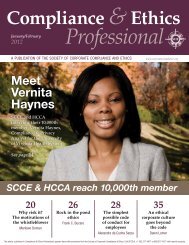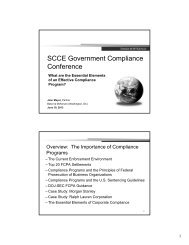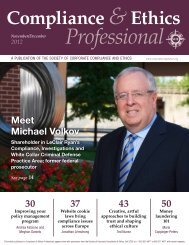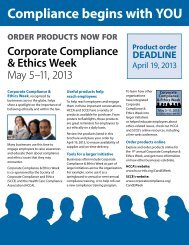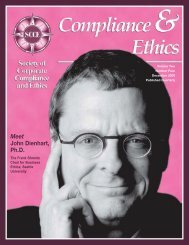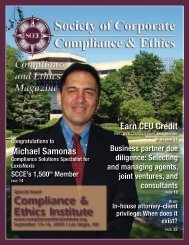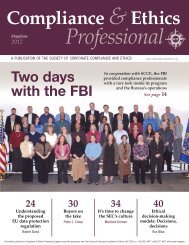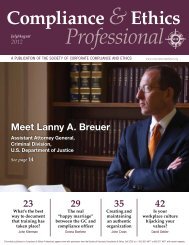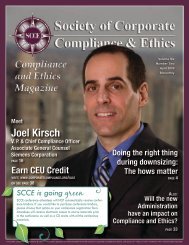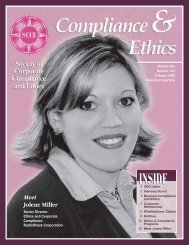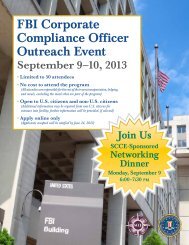Compliance & Ethics Professional - Society of Corporate ...
Compliance & Ethics Professional - Society of Corporate ...
Compliance & Ethics Professional - Society of Corporate ...
- No tags were found...
You also want an ePaper? Increase the reach of your titles
YUMPU automatically turns print PDFs into web optimized ePapers that Google loves.
important message is the size <strong>of</strong> the awardsjuries are willing to make, even against defendants<strong>of</strong> limited means.In one <strong>of</strong> the file sharing cases (SonyEntertainment et al v. Tenenbaum), 2 the U.S.Court <strong>of</strong> Appeals just issued its opinion. Thecourt reinstated the large jury award, holdingthat the trial judge should not have rushed tomake a constitutional ruling (that the damagesawards were unconstitutionally large) withoutfirst using its common law power to issue a“remittitur,” an order allowing a plaintiff tochoose between a reduced award and a newtrial on damages. The opinion is lengthy, butkey points for business and other institutionalinfringers include:··The right <strong>of</strong> copyright owners to demandthat a jury set statutory damages isreaffirmed.··Because statutory damages are intended todeter and punish as well as to compensate,it is error for a judge to tell the jury thatthe total amount <strong>of</strong> a statutory damagesaward needs in any way to be related tothe amount <strong>of</strong> actual damage (such as lostpr<strong>of</strong>its) suffered by the copyright holder.··Presumably because <strong>of</strong> the differentpublic policies underlying copyright law,Supreme Court precedents limiting punitivedamages seem not to apply to statutorydamages. (The court avoided a directruling, but made its views pretty clear).Individual infringers may take someconsolation from the possibility <strong>of</strong> a remittitur.But that remedy <strong>of</strong>fers little solace forbusinesses and other institutions, because nomodern U.S. court has ever granted a remittiturto such an infringer. Indeed, in the LeggMason case mentioned above, the trial courtdeclined to reduce a $20 million award forcopying a financial newsletter.It is important to remember that each issue<strong>of</strong> a publication is a separate work entitled to aseparate award <strong>of</strong> statutory damages. Thus, abusiness whose employees have been forwardingor otherwise infringing a daily newsletterfor a year faces a worst-case liability <strong>of</strong> almost$40 million. For infringement <strong>of</strong> a weekly, theexposure is nearly $8 million. So multi-milliondollar settlements <strong>of</strong>ten make sense.Your business doesn’t have to accept suchrisks. Relatively simple best practices can greatlydiminish your exposure. I discussed thosebest practices in an article I wrote in 2007, 3 andthe advice I give there still holds. Meaningfulemployee education, periodic polling <strong>of</strong>employees about copying, realistic evaluation<strong>of</strong> subscription needs, and taking out anappropriate license from Copyright ClearanceCenter, all taken together, will work. But effectiveprotection requires someone to take charge,whether it is corporate counsel, an informationpr<strong>of</strong>essional, or an alert executive. So long asemployers’ heads remain planted in the sand,unpleasant surprises will arrive from behind.I represent publishers in addressinginfringements. But, those publishers muchprefer to make their livings from selling subscriptionsto the publications they create, andthey actively warn against infringement andencourage me to do likewise. However, astechnology has made copying easier, they havebeen increasingly victimized, and they are notgoing to take it anymore. Employers who providecomputer systems to their employees andreap the benefits <strong>of</strong> those wonderful devicesmust effectively prevent employee infringementand obtain proper licenses, or accept theconsequences. ✵1. Lowry Reports Inc. v. Legg Mason et al. 271 F.Supp.2d 737 (2003) UnitedStates District Court, D. Maryland, Northern Division. July 10, 2003.2. See Sony BMG Music Entertainment v. Tenenbaum, 721 F. Supp. 2d 85(D. Mass. 2010).3. Thomas W. Kirby: “Managing Copyright Liability in the ComputerAge.” Copyright Clearance Center, Inside Counsel, November 16,2007. Available at www.copyright.com/media/pdfs/article-inside-counselthomas-kirby.pdfThomas W. Kirby is a senior litigation partner at Wiley Rein LLP. He can bereached at tkirby@wileyrein.com.<strong>Compliance</strong> & <strong>Ethics</strong> <strong>Pr<strong>of</strong>essional</strong> March/April 2012+1 952 933 4977 or 888 277 4977 | www.corporatecompliance.org 61




